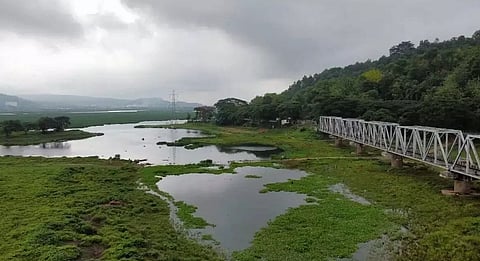
- Home
- Live Blog
- Breaking News
- Top Headlines
- Cities
- NE News
- Sentinel Media
- Sports
- Education
- Jobs

STAFF REPORTER
GUWAHATI: Deepor Beel, a crucial wetland for maintaining environmental balance and conservation in Guwahati, is now on the brink of ecological collapse due to government and private enterprise activities. Pramod Kalita, General Secretary of the Deepor Beel Suraksha Manch, highlighted these concerns during an intimate talk programme at the Deepor Beel Dhaba and Restaurant in Chakardoi Kalitapara, near Deepor Beel.
Speaking at the event, Kalita lamented that approximately 70 percent of the Beel, once teeming with diverse indigenous fish species, has been lost. He attributed this environmental degradation to the establishment of a dumping ground by the Government of Assam, the Guwahati Municipal Corporation, and other agencies on the banks of the Beel about two decades ago. The wastewater from Guwahati has been channelled into the Beel through the Pamohi Canal, exacerbating the pollution.
Kalita also pointed out that the water canal under the Arjunguri bridge on the National Highway near Girijananda Choudhury University in Azara, which facilitated the outflow of water from Deepor Beel, has disrupted the natural water movement. Although the current low water levels in the Beel obscure the negative impacts of this obstruction, the area near Azara is at risk of severe flooding if the water level rises.
The government’s actions have demonstrated a lack of commitment to preserving the Beel’s biodiversity. The natural stream that once transported water to the Brahmaputra river in Palashbari, approximately ten kilometres away, has vanished in many places due to human errors. This disruption threatens to flood a vast area from the Dharapur intersection to Palashbari if the water flow is not restored.
Kalita criticized the lack of research or studies by government departments or agencies to assess the impact of development projects on the Beel’s biodiversity. He called for the government to adopt policies that protect the rights of the Azara fishing community, which plays a vital role in maintaining the ecological balance of Deepor Beel. The event was attended by several members of the Deepor Beel Suraksha Manch, including advisor Sanesh Teran, executive member Deepak Teran, and Dilip Kalita, an activist from Khanamukh Milan Sangha.
Also Read: Gauhati High Court seeks details on demarcation and earth filling in Deepor Beel (sentinelassam.com)
Also Watch: